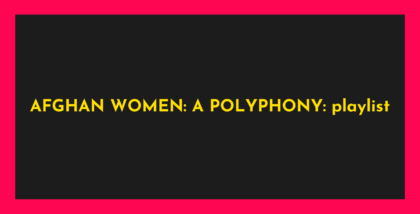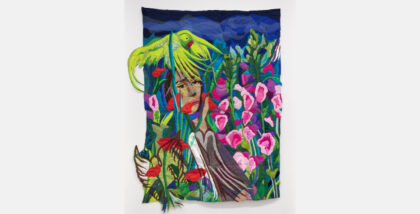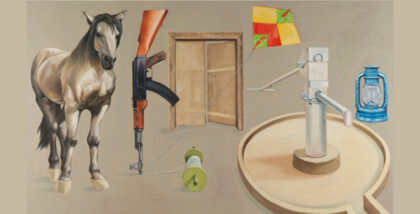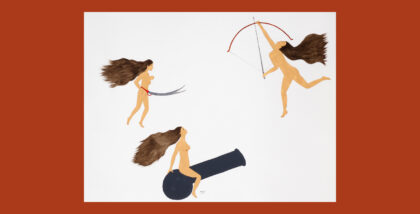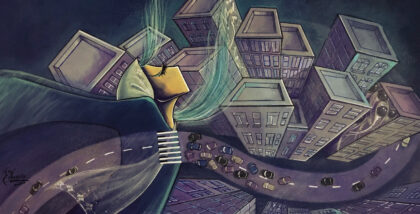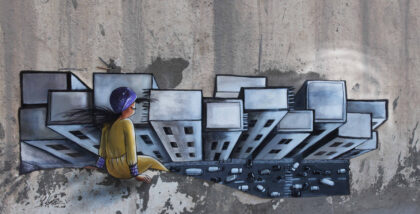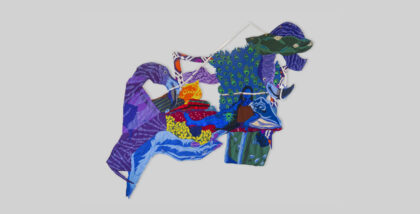 Paraqcha ha, 2018, gouache on paper, Kubra Khademi. Courtesy of Galerie Eric Mouchet.
Paraqcha ha, 2018, gouache on paper, Kubra Khademi. Courtesy of Galerie Eric Mouchet.
Artist and activist Shamayel Shalizi had a one-way ticket back to Kabul when Taliban forces retook control of the capital last August. Since then, she has been fighting from afar for Afghanistan, where her family originates and which she fell in love with the moment she moved there as a 14-year-old in 2007, after a tumultuous childhood in Russia and the United States. But that fight, she says, has felt like “going up a down escalator.”
Shalizi, who describes herself as a “multimedia artist, socialist punk, and general nuisance,” is best known for her jewelery and apparel line Blingistan—hoop earrings resembling barbed wire, shorts with حلال (halal) emblazoned on the seat, an InshAllah choker in baroque font—and, increasingly, for her no-holds-barred commentary. Her recurring Instagram live series, “Diaspora Passing,” hosted with fellow Afghan Mina Sharif, is a wide-ranging exploration of modern-day Afghanistan. Why does fun—and time—feel different in the country? What is the Good Afghan Girl Trope? What exactly is ghairat—honour—and is it beautiful or toxic or both?
With one foot in the wataan—homeland—and the other in the diaspora, Shalizi, 29, sees herself as both therapist and provocateur: challenging lazy narratives, especially those espoused by Afghans who left the country in the 1970s and 1980s, understanding the anxieties behind those narratives, and refusing, always, to tell a single story about Afghanistan.
Alizeh Kohari: You spent your early childhood in the US and Russia, but you’ve said Afghanistan is where you became your authentic self for the first time. What was it like to move there?
Shamayel Shalizi: When I arrived in Kabul, I was a teenager. I was 14. Both Russia and the US aren’t really places where I feel I belong. Racisim, oppression, divorced parents, single mom, sexual assault, problems at school—all of those things never let me feel at home in those places. In Kabul, what was amazing was that I grew up in a house with a very eccentric father, who pushed us to be our authentic selves. I was allowed to do whatever I wanted. I was pushed to create art; it was just as important as math or science. I went out at night and graffitied the streets. I wasn’t doing that in the US.
I learned joy in Kabul. I learned gratitude. I learned what I think is the meaning of my life: to work for the people of Afghanistan, to put my art and my lived experiences to use towards that purpose.
Alizeh Kohari: Your father worked in sustainable agriculture in Afghanistan. I understand this was somewhat disruptive to local power dynamics and also had an impact on your life outside of Afghanistan.
Shamayel Shalizi: When my dad came back to Afghanistan, his idea was to start sustainable farming in our paternal village in Ghazni province, a part of the country where opium is a big deal and growing poppy is the best way to make money. So my dad thought of introducing things like saffron and angora goats that are more lucrative than poppy. It wasn’t a business at first, but it did well enough that they brought it to Kabul. The story goes that one of his proposals was shopped around and made its way to USAID kinds of places and then bam, he was blacklisted. Because he was saying X amount of money is needed to make a village transition away from poppy, and that number was hundreds of times lower than what the Americans said that they were doing when they were spending money “eradicating poppy.”
Alizeh Kohari: So he was a threat to the American development apparatus because he was a local doing things more effectively?
Shamayel Shalizi: I don’t think it’s accurate to say that he was a threat. It’s 100% associated with his work countering opium. Afghanistan is a narco state right now—that was the US’s intention. Small incentives like [my father’s] are a huge threat to exposing their true intentions of what they wanted for Afghanistan, what they always wanted, which is very different from the narrative that they give to the rest of the world. It seems kind of tinfoil hat-esque but it’s the truth.
After that, traveling around with my dad was just impossible. We would get searched for hours and stopped at airports. My grandma was followed by FBI, questioned [at home]. My dad’s entire family was questioned multiple times about his work in Afghanistan. After some time, my dad’s lawyer said, “You can’t go back to the US. It’s too dangerous.” Now I have an irrational fear of someone I love or myself getting sent to Guantanamo.
Alizeh Kohari: How has your relationship to Afghanistan changed since your father’s death?
Shamayel Shalizi: When my dad died, I felt it was Afghanistan that killed him. I felt the country had betrayed me and him. Here’s someone who dedicated his life to this country and look at how it turned out for him. He passed away in 2017. I was 24, I think. I got very, very jaded for a year. I couldn’t even say the word Afghanistan.
I hit my rock-most bottom. As I started to pull myself back out of that, I realized what was important to me—which was to heal and repair myself and my relationship with Afghanistan. I refound Afghanistan that way. We’ve gone through wear and tear, me and Afghanistan, and we still chose each other. I fight for Afghanistan in a different way now. Nothing can break my bond with this beautiful and annoying country of mine.
When you represent a people as tragic, you take their humanity away.
Alizeh Kohari: What does fighting for Afghanistan look like right now for you?
Shamayel Shalizi: I feel like I’m going up a down escalator. Pre-August [before the Taliban seized control], I was trying to use my platform to educate Afghans who didn’t have access to the history of Afghanistan, what I learned while living in Kabul with the people who lived through that history. It’s not as binary as immigrant parents made it out to be. You can’t just say, “Oh, the communists were evil.” Which communists? There were many communist groups. Or that the monarchy was perfect. No, it wasn’t—80% of schools were in Kabul.
Now it’s extra work and undoing multiple knots. We still need to talk about all that history. We still need to change the narrative of Afghanistan in the world. No, the Taliban aren’t good, but they’re also not what you thought of them one and a half years ago because their story has been told incorrectly for 30 years.
Then there’s also the fact that we’ve spent 30-40 years in international media as “The Tragedy.” When you represent a people as tragic, you take their humanity away. I find it really difficult for non-Afghans and even some diaspora Afghans to see people in Afghanistan as [multidimensional] human beings. Without humanity, you can’t foster the empathy to fight alongside them.
Last summer, I was in emergency adrenaline mode. June, July, it started getting weird, and then August. I wasn’t eating, sleeping, it was just go, go, go. I wasn’t even crying that much. I remember one day I took a shower and I just bawled for a really long time, and that was it. Up. We have people to help evacuate. We have interviews to give, et cetera, et cetera. I think it kind of protected us. Shifting to a long term view is actually the struggle—like, how can we be best of service to the country when the funds are frozen?
I didn’t sit and mourn the fact that [right around the time of the Taliban takeover] I had a flight to move back to Kabul. I haven’t even processed that at all because I can’t. I’ll deal with it at another point.
Alizeh Kohari: With regards to narratives, I wanted to ask: as someone who primarily writes for a particular section of people—they could be Pakistani, but then they’re English-speaking Pakistanis—I often find it exhausting to have to first speak to existing misconceptions and attempt to undo them before getting to a point where you can have the conversations you really want to have. Is that something you find grating or enjoyable?
Shamayel Shalizi: There’s a part of me that likes breaking misconceptions, but I think that joy has run its course. It was more exciting when I was in my late teens and my early 20s. I don’t have as much patience for it. Me and a friend who lived in Kabul for 15 years, we use our lived experiences to have this weekly show that we call “Diaspora Passing.” Because we pass as diaspora, but our allegiance is 100% to the people in Afghanistan. We try and show [to the younger English-speaking Afghan diaspora] that your country is not how the headlines make it out to be, don’t internalize all the racism and Orientalism.
I do believe in decolonizing people. We all need it [including Afghans in the diaspora]. When you have waves of refugees from a country, they’re like—how would you put it—frozen in time. They’ve brought the culture of that time, of that country, of their class to the diaspora.
Kids my age in Afghanistan are so incredibly aware of politics. They know what’s going on. When you see their counterpart refugee child or kid who had parents who were refugees, whether they came in the 70s, 80s, 90s, or in the 2000s, they’ve internalized their parents’ narrative and they operate from emotion, only emotion. I’m getting passionate about it because it’s the most frustrating thing. You’re jeopardizing your people at home [who may have completely different politics and aspirations] by your emotions that aren’t even your lived experiences. They’re your parents’ experiences or maybe even your grandparents. That’s one of our biggest kryptonites as a people.
Alizeh Kohari: What are some frozen-in-time assumptions that the diaspora holds about Afghanistan?
Shamayel Shalizi: I’ve become this de facto therapist. Kids my age ask me why their family reacts to things in certain ways. Like, why do they think getting tattoos is “low-class”? Oh, because they’re part of the Kabul elite who thought tribal tattoos are for those “scumbag,” “low-level” tribal people. All of these ideas that they brought with them were suspended in time in the 80s—and were also affected by their class position.
People don’t tell the history of their country, they tell the history of their family as the country’s history. If you had a great life in Kabul in the 70s, I’m happy you had that and I’m sorry that life changed for you. But other people did not. A huge amount of the country did not. And you cannot nullify their life to make your immigrant story sound more interesting. They say if you’re wounded and you don’t address the wound, you bleed on others without knowing it. Assimilation is a wound. Immigration is a trauma. It’s not something that should be treated as “we were in danger, now we’re safe.”
Alizeh Kohari: To that end, given all that has happened in Afghanistan, do you find people there are lot more politically savvy than other places where you’ve lived?
Shamayel Shalizi: Yeah, because our existence is political—the fact that we’re alive is political. Like I said, kids I was hanging out with in Afghanistan had much more political savviness than their diaspora counterparts. I can’t speak to other nations and how they feel, but I’ve spoken to Palestinian people, I’ve spoken to Cubans, and we [people with politicized collective identities] seem to have a different grasp on our identity because it’s been taken from us and it’s been pulled and pushed.
Alizeh Kohari: How useful is it to talk about Afghanistan as a monolith? I mean, there’s obviously the collective experience of war, even though that experience probably differed depending on class and geography.
Shamayel Shalizi: It’s not useful because we have over 30 languages spoken in the country. We have many different ethnic groups. And yes, we’re all the land of Afghanistan now, but those borders are colonized borders. The Durand Line [the 1893 border between Pakistan and Afghanistan, established during the British empire] is a sham. It’s just a complete mess. We all lived under war, but a Hazara person also lived under systemic oppression because they’re Hazara, a Sikh person had to live under Sharia law and he’s not Muslim. And then you add gender. Women went through something different. A Hazara woman has a different experience. My grandmother is Tamil—there are plenty of stories I can tell you about having a Tamil grandma who lived in Afghanistan.
Alizeh Kohari: I was in the US when Trump was elected and I remember white New Yorkers apologizing to me, asking me if I felt safe. And I couldn’t help thinking, that’s not the most useful thing you can ask me. Ask me what it’s like to live under authoritarian rule—we can compare notes, now that you’re going to go through it too. That’s a more useful exchange than “oh, we’re so sorry you’re going to get screwed here too, after we’ve screwed you over in your own country.”
Shamayel Shalizi: That’s a perfect point. Liberalism is the thorn in my ass at every turn. At least with conservatives, you know who they are and what they believe in. But with liberals, the white saviorism is maddening. Like, okay, you recognize that Trump is evil, but you don’t want to talk about the 300 people that came before him who were also evil? Going deeper isn’t going to kill us. We’re on earth to learn.
Alizeh Kohari: What was it like growing up in Moscow?
Shamayel Shalizi: Well, it was the Russian Federation. My dad went to high school in the Soviet Union. I think my relationship to Slavic people and culture is a bit biased because my innermost reptilian brain recognizes Russia and it feels warm and of my childhood and of a safer, more stable time for me. But Russian culture is also more similar to Afghan culture. Russians sit around big tables full of food and drink with their family and friends for hours and hours, just like we do. They’re a country that takes up all of Asia. They’re hella Asian. You know what I mean?
Do you know how many Russian soldiers defected when they were fighting in Afghanistan? We don’t have a count, that’s how many.
They say if you’re wounded and you don’t address the wound, you bleed on others without knowing it.
Alizeh Kohari: People have highlighted the asymmetry of the global response to the war in Afghanistan compared with the Russian invasion of Ukraine. To what extent, if at all, is this productive?
Shamayel Shalizi: I have a few things to say on this subject. First of all [the critique of how Western response to the war in Ukraine differed from the war in Afghanistan] has 100% been co-opted by all of these dumb neoliberal Muslims living in the West, people like Khalid Beydoun for whom it’s more important to talk about how oppressed he is in the West. It doesn’t fit their narrative to say, “Look at those Muslims—as well as the Christians, Sikhs, Buddhists, Zoroastrians, all the other faiths, Jews, all of those people, but also the Muslims—suffering in Afghanistan under self-proclaimed Muslims.” But when it’s Ukraine, they get to say: “No one cared about the Muslim victims, but they care about the white victims, the Christian victims.” That needs to stop. If you’re going to speak as the Muslim victims, then I dare you to also talk about how our [current] oppressor is Muslim.
My second problem is that the ones who are in the West, who speak in colonizers’ tongues, end up becoming the loudest voices for Afghanistan just by virtue of their language skills, even when they might not have the same grasp as someone who could speak in Dari or Pashto on these same subjects. That’s a problem—and again, they lead with their own wounds. Afghanistan Twitter, Afghanistan Instagram, Afghanistan Clubhouse—everyone was dissecting how [Ukrainians were being deemed sympathetic because they are “civilized”] rendering Afghans by extension “uncivilized.” I had to stay off the internet when this was happening. You guys haven’t been living in the West for the past 30 years? You haven’t been made to feel uncivilized all this time [you were living there]? How do you think the past 50 years [of imperialist intervention in Afghanistan] happened? The past 20 years were justified because white men needed to save Afghanistan’s women from their “uncivilized” Afghan men. You’ve been treated as uncivilized for your whole life. So much so that you’ve internalized it.
Everyday Afghans in Afghanistan were heartbroken to see what’s happening in Ukraine because they know that pain. But what’s happening in Ukraine is attached to Afghanistan. The whole world looks the way it does right now because of the [the Soviet occupation] of Afghanistan in the 80s. If the mujahideen didn’t get equipped and armed [by the USA, against the Soviets] and didn’t fight the way they did, maybe the Soviet Union would still be around and the whole world would look different [and the current conflict would be playing out differently]. We’re in this place directly because of what happened in Afghanistan. We’re all in this together.
But if you are supporting Ukraine in a way that I think is performative activism, I don’t want you to fight for Afghanistan. Because you’re going to mess it up. Because you don’t understand.
People sometimes speak to me about having solidarity with Afghanistan as if they’re giving me something. Like, here, have some of this of mine—
Alizeh Kohari: Like charity.
Shamayel Shalizi: Exactly. And it’s like, no, this actually directly affects you, too.
Alizeh Kohari: Speaking of solidarity, the Pakistani state has done its fair share of damage in Afghanistan. And as you say, the Durand Line is a colonial construct; there are Pashtuns on both sides with longstanding ties. How can Pakistanis be better allies for Afghanistan right now?
Shamayel Shalizi: Well, number one: learn your history. This is with a little bit of shade; the history is quite short. It’s a new country. I call Pakistan “South Asian Israel”—mostly because it makes Pakistanis who are anti-Afghan very angry [chuckles], but also because Pakistan and Israel were set up by the British within a year of each other with colonial borders, taking people with no connection to each other and shoving them under one state that operated from religion, not from a national identity. And when you don’t have a national identity, it creates insecurity.
I get the most amount of death threats and rape threats from Pakistanis. I don’t get them from Afghans. When Pakistani people threaten me what they’re saying to me is, “Oh, you guys are so proud of your culture. And what the hell even is it?” They’re always so angry at my Afghan identity, at celebrating Nowruz, at wearing our traditional clothes. And when I see that, I’m like, something’s going on inside of you that smushes national identity and religion in this very toxic way that isn’t true to the Pakistani spirit.
Alizeh Kohari: There’s been a pernicious discourse about Afghan women even when there’s a longstanding local tradition of female participation in liberation struggles, all the way from Malalai of Maiwind [a 19th century female fighter who rallied against the British] to, say, Meena [founder of RAWA, the Revolutionary Association of the Women of Afghanistan]. How accessible are those stories? In Pakistan, you have a very strong tradition of folk heroines, who are the ones sacrificing or fighting or doing. Is it similar in Afghanistan, as well?
Shamayel Shalizi: It is. I have a massive Malalai tattoo on my shoulder. Our female heroines are openly and proudly talked about. Malalai’s story is very important, I think, because a lot of us didn’t have the luxury of not being part of our revolutions. First of all, patriarchy is fucking global. I have lived as a woman in all three worlds and I can tell you it’s present and alive everywhere. I know this is true for me and I know it’s true for a lot of my friends: the image of Afghan women that’s perpetuated all over the world is not someone that we know in our families or in our lives.
Alizeh Kohari: Do you find there’s a dissonance between how women folk heroines from the past are talked about versus how living, breathing women are treated?
Shamayel Shalizi: I think that dissonance does exist, but I don’t know if it’s as intense as it might seem. For example, a very conservative Muslim Afghan might have a problem with what I’m doing, but they might also not have a problem because I’m protected by my love for my country, because our identity has been such a thing.
I know I’m biased because I grew up with a single dad and with brothers and the person I am right now and what I do is 100% because of the Afghan men who always supported me. It’s their fucking fault that I’m this way. I know there are certain Afghans who are very conservative Muslims who don’t even want to talk about our pre-Islamic times or about women that might have existed, but sorry, they’re not everyone. And they don’t get to erase the history, just like I wouldn’t allow a monarchist supporter to erase the history of our past 50 years. They don’t get to speak on our behalf.
